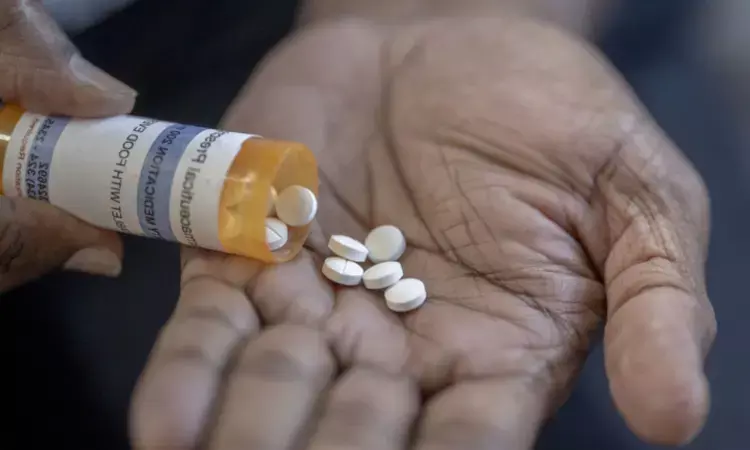- Home
- Medical news & Guidelines
- Anesthesiology
- Cardiology and CTVS
- Critical Care
- Dentistry
- Dermatology
- Diabetes and Endocrinology
- ENT
- Gastroenterology
- Medicine
- Nephrology
- Neurology
- Obstretics-Gynaecology
- Oncology
- Ophthalmology
- Orthopaedics
- Pediatrics-Neonatology
- Psychiatry
- Pulmonology
- Radiology
- Surgery
- Urology
- Laboratory Medicine
- Diet
- Nursing
- Paramedical
- Physiotherapy
- Health news
- Fact Check
- Bone Health Fact Check
- Brain Health Fact Check
- Cancer Related Fact Check
- Child Care Fact Check
- Dental and oral health fact check
- Diabetes and metabolic health fact check
- Diet and Nutrition Fact Check
- Eye and ENT Care Fact Check
- Fitness fact check
- Gut health fact check
- Heart health fact check
- Kidney health fact check
- Medical education fact check
- Men's health fact check
- Respiratory fact check
- Skin and hair care fact check
- Vaccine and Immunization fact check
- Women's health fact check
- AYUSH
- State News
- Andaman and Nicobar Islands
- Andhra Pradesh
- Arunachal Pradesh
- Assam
- Bihar
- Chandigarh
- Chattisgarh
- Dadra and Nagar Haveli
- Daman and Diu
- Delhi
- Goa
- Gujarat
- Haryana
- Himachal Pradesh
- Jammu & Kashmir
- Jharkhand
- Karnataka
- Kerala
- Ladakh
- Lakshadweep
- Madhya Pradesh
- Maharashtra
- Manipur
- Meghalaya
- Mizoram
- Nagaland
- Odisha
- Puducherry
- Punjab
- Rajasthan
- Sikkim
- Tamil Nadu
- Telangana
- Tripura
- Uttar Pradesh
- Uttrakhand
- West Bengal
- Medical Education
- Industry
Empagliflozin fails to reduce HF hospitalizations, deaths after acute MI: EMPACT-MI

USA: Treatment with empagliflozin did not lead to a significantly reduced risk of first hospitalization for heart failure (HF) or death from any cause than placebo among patients at increased risk for HF after acute myocardial infarction (MI), according to the EMPACT-HF trial. The findings were published online in the New England Journal of Medicine on April 6, 2024.
Between empagliflozin and placebo groups, the researchers found no difference in the time-to-first-event analysis of hospitalizations for HF or deaths from any cause over approximately 18 months (8.2% vs 9.1%), which came out to 5.9 and 6.6 events per 100 patient-years, respectively (HR 0.90).
Mortality alone appeared unchanged with empagliflozin (5.2% versus 5.5%), but there was a 22% reduction in first hospitalizations for HF (3.6% versus 4.7%, HR 0.77).
The SGLT2 inhibitor empagliflozin (Jardiance) improves cardiovascular (CV) outcomes in patients with heart failure, patients with type 2 diabetes who are at high CV risk, and patients with chronic kidney disease. The efficacy and safety of empagliflozin in patients who have had acute myocardial infarction are unknown. To fill this knowledge gap, Javed Butler, Baylor Scott and White Research Institute, Live Oak St., Dallas, TX, and colleagues conducted an event-driven, double-blind, randomized, placebo-controlled trial.
Patients who had been hospitalized for acute myocardial infarction and were at risk for heart failure were assigned in a 1:1 ratio to receive empagliflozin (n=3260) at a dose of 10 mg daily or placebo (n=3262) in addition to standard care within 14 days after admission. The primary endpoint was a composite of hospitalization for HF or death from any cause as assessed in a time-to-first-event analysis.
Based on the study, the researchers reported the following findings:
- During a median follow-up of 17.9 months, first hospitalization for heart failure or death from any cause occurred in 8.2% of patients in the empagliflozin group and 9.1% of patients in the placebo group, with incidence rates of 5.9 and 6.6 events, respectively, per 100 patient-years (hazard ratio, 0.90).
- For the individual components of the primary endpoint, a first hospitalization for heart failure occurred in 3.6% of patients in the empagliflozin group and 4.7% of patients in the placebo group (hazard ratio, 0.77), and death from any cause occurred in 5.2% and 5.5% patients, respectively (hazard ratio, 0.96).
- Adverse events were consistent with the known safety profile of empagliflozin and were similar in the two trial groups.
In conclusion, the SGLT2 inhibitor empagliflozin did not exactly prevent deaths and heart failure events when initiated atop other standard therapies for acute myocardial infarction, but the cumulative risk did go down.
Reference:
Butler J, et al "Empagliflozin after acute myocardial infarction" N Engl J Med 2024; DOI: 10.1056/NEJMoa23104051.
Dr Kamal Kant Kohli-MBBS, DTCD- a chest specialist with more than 30 years of practice and a flair for writing clinical articles, Dr Kamal Kant Kohli joined Medical Dialogues as a Chief Editor of Medical News. Besides writing articles, as an editor, he proofreads and verifies all the medical content published on Medical Dialogues including those coming from journals, studies,medical conferences,guidelines etc. Email: drkohli@medicaldialogues.in. Contact no. 011-43720751


